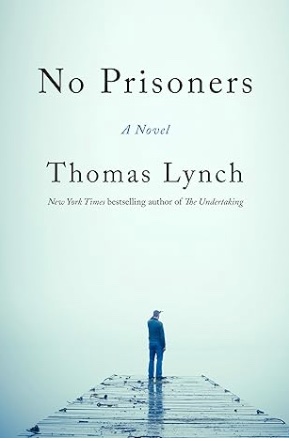
Socrates, who famously said that the unexamined life is not worth living, never met Doyle Shields, the main character in Thomas Lynch’s novel No Prisoners. Shields examines his life endlessly, especially his involvement in fierce combat in the South Pacific in World War II, and is stymied in his search for any sense that his life has made a difference. A psychologist once told me the happiest people are those who don’t think deeply. Would Socrates leave room for the possibility that it is possible to over-examine one’s life? Doyle Shields is many things, but I wouldn’t call him a happy man. Haunted? Yes. But happy? I’m not sure.
Thomas Lynch is well-known to many Reformed Journal readers as a poet, essayist, and undertaker. His book The Undertaking: Life Studies from the Dismal Trade won the American Book Award and was a finalist for the National Book Award. He’s published several collections of poetry and books of essays, and ventured into fiction about 15 years ago with the story collection Apparitions and Late Fictions. No Prisoners is his first novel.
Although this is fiction, there are plenty of autobiographical elements in Doyle Shields—like Lynch, he is a retired embalmer living in Northern Michigan—but other pieces of his story, particularly his experience in World War II—are drawn from Lynch’s father’s life. But the details don’t matter as much as the meaning, or the search for meaning, and as the end of Doyle’s life approaches, he’s obsessed with questions of meaning and purpose, endlessly wondering if it has mattered that he lived. He decides both life in general and his life specifically are not imbued with meaning, which only helps fuel his anger toward the God he has given up believing in. God is the Moby Dick of Doyle’s life, the elusive force that drives him on a relentless quest. This is not just a book about a life, it’s a book about a life in search of God.
The novel is unconventional; readers hoping for a story that goes from point A to point B will be frustrated. Instead, the book begins and ends with Doyle’s death at age 90. In between, we get him ruminating on his life, from his days as a Catholic school student, to his time in combat, to his long marriage to Sally, the red-headed girl of his dreams, to his final years as a widower and a steamy late-in-life romance with Johanna.
Early in the book, Yeats’s assertion that the only things worth thinking about are sex and death is cited, and there is plenty of both. Lynch’s reveling in sex brings John Updike to mind, although I’m not sure Updike ever used as vivid a vocabulary as Lynch employs. He is clearly having fun using obscure words for the various body parts and sexual encounters Shields enjoys, and I can only say that while it is difficult for me to imagine so much erotic activity when one has reached his or her 70s, 80s, and even 90th year, all I can do is hope.
As I mentioned, there isn’t a plot or story driving this novel, no mystery whose solving keeps the reader turning the pages. In lieu of a story, what kept me turning the pages was the writing. Lynch is a master stylist and I love reading his beautiful lyrical writing. Many of the pages and passages of No Prisoners fairly sing. However, I realize this book isn’t going to please everyone—time itself is a challenge, as is keeping track of various details, which sometimes contradict each other. Doyle’s mind leaps so frequently, figuring out who is doing what when can be a puzzle. I’m reminded of Frederick Buechner’s Godric, who tells his tale from both ends at once and freely admits to not keeping it straight. Lynch is channeling William Faulkner, who said that the past is never dead, it’s not even past. I saw myself in Doyle Shields in this way—as I age, I feel like time is a parlor trick and the past exists as powerfully to me as the present, although I have curated the past and confused a lot of details in the process.
Looking back at the paragraph I just wrote, I wonder if I’ve told the whole truth when I said there was no mystery to keep the reader turning the book’s pages. God is the great mystery. Although Doyle Shields says he does not believe in God, he lives in disputation with God. It was God, after all, that took his beloved wife from cancer at age 65, leaving Doyle a widower for 25 years. Worse yet, it was God who took Doyle’s troubled daughter, who cut off her family and later ended her own life by leaping from the Golden Gate Bridge. And who but God can offer Doyle absolution and forgiveness from his searing guilt over the countless lives he took in combat while fighting an enemy who would not surrender? “No prisoners” was the command Doyle obeyed, using his bayonet to end the lives of the wounded, mercilessly killing broken young men who offered no resistance. It is these events that haunt Doyle’s days and nights and endlessly cycle in his brain.
Just like the Marines fighting island to island against the Japanese, life takes no prisoners. You’ll have to read the book for yourself to learn if God shows up to Doyle Shields at the end of his days. Ultimately, it’s worth pondering with Doyle Shields (and Thomas Lynch) if the everyday graces and blessings we experience are signs of something and someone, far greater and more elusive than ourselves.


2 Responses
Thanks for the review. Love Thomas Lynch’s work. I still go back to Dismal Trade again and again.
Tom’s writing is lyrically exceptional. Another such writer is this Jeff Munroe. I read this review three times because I wanted to experience how he brings together song and surprise.